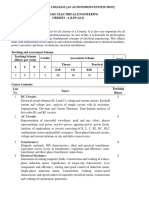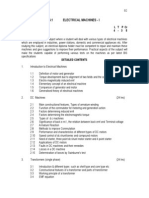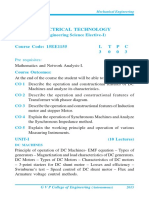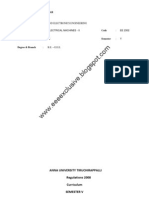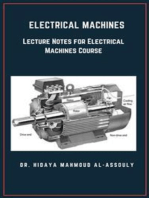Syllabus For Basic Electrical 2018-19
Syllabus For Basic Electrical 2018-19
Uploaded by
iamrichtraderCopyright:
Available Formats
Syllabus For Basic Electrical 2018-19
Syllabus For Basic Electrical 2018-19
Uploaded by
iamrichtraderOriginal Description:
Original Title
Copyright
Available Formats
Share this document
Did you find this document useful?
Is this content inappropriate?
Copyright:
Available Formats
Syllabus For Basic Electrical 2018-19
Syllabus For Basic Electrical 2018-19
Uploaded by
iamrichtraderCopyright:
Available Formats
Vishwakarma University, Faculty of STEM
BTECHME18302 Basic Electrical Engineering
Teaching Scheme Credits Evaluation
Lectures : 3 Hours/Week 3 Scheme
CIE: 50 Marks
ESE: 50 Marks
Prerequisites:
Course Objectives
1. To impart knowledge on fundamentals of 1-Φ A.C. circuits and its applications.
2. To inculcate knowledge on the basic operation and the performance of 1-Φ transformer.
3. To impart knowledge on fundamentals of 3-Φ A.C. circuits and its applications.
4. To provide knowledge on fundamentals of DC machines.
5. To provide knowledge on fundamentals of Induction motor
6. To provide knowledge on fundamentals of LT switchgear and power measurement
Course Outcomes : On completion of the course, student will be able to
1.To evaluate 1-Φ AC circuits.
2. To illustrate constructional features and operation of 1-Φ transformer.
3. To evaluate 3-Φ AC circuits.
4. To illustrate working principle of DC machines, Stepper motor and linear motors
5. To illustrate working principle of single phase and three phase induction motor
6. Classify and know about low tension switchgear
7.Measure power in single phase and three phase circuits
COURSE CONTENTS
UNIT-1 AC Circuits 9 Hours
Representation of sinusoidal waveforms, peak and rms values, phasor representation, real
power, reactive power, apparent power, power factor,
Analysis of single-phase ac circuits consisting of R, L, C, RL, RC, RLC combinations (series
and parallel), resonance.
UNIT-2 Balanced Three phase circuits and Transformers 9 Hours
Three-phase balanced circuits, voltage and current relations in star and delta connections.
Magnetic materials, BH characteristics, ideal and practical transformer, equivalent circuit,
losses in transformers, regulation and efficiency.
Auto-transformer and introduction to three-phase transformer connections.
UNIT-3 D. C. Machines, Stepper motors and 9 Hours
introduction to linear motors
Construction, working principle of D.C. motor, types of D.C. motor, back emf, torque equation
for D.C. motor, characteristics of D.C. motor (series and shunt only), three-point starter for D.C
shunt motor, methods for speed control of D.C. shunt and series motors, industrial applications.
Construction, working principle, characteristic and applications of stepper motors.
Introduction of Linear motors
UNIT-4 Three Phase and single phase Induction Motors 9 Hours
SY (Mechanical Engineering) Syllabus 2018 Pattern <Page No. >
Vishwakarma University, Faculty of STEM
Constructional feature, working principle of three phase induction motors, types; torque
equation, torque slip characteristics; power stages; efficiency, starters (auto transformer starter,
star delta starter); methods of speed control and industrial applications. Single phase induction
motors,(types, construction, working principle of split phase and shaded pole type induction
motors)
UNIT-5 LT Switchgears and power measurement 9 Hours
Introduction to LT switchgear, NO and NC contacts, contactors, relays, timers, use in control
panel, application in interlocking and protection, symbols.
Measurement of electrical power using wattmeter, Three wattmeter method and Two
Text Books :
1. A Textbook of Electrical Technology Volume- I and volume II –B. L. Theraja, S. Chand
and Company Ltd., New Delhi
2. . Basic Electrical Engineering, V. K. Mehta, S. Chand and Company Ltd., New Delhi.
3. Theory and problems of Basic Electrical Engineering- I. J. Nagrath and Kothari, Prentice-
Hall of India Pvt. Ltd.
4. Nagrath & Kothari, “Electrical Machines”, Tata Mc Graw
5. Ashfaq Husain, “Electrical Machines”, Dhanpat Rai & Sons.
6. S. K. Bhattacharya, “Electrical Machine”, Tata Mc Graw Hill publishing Co. Ltd,2nd Edition.
7. Electrical Machines, R. K. Rajput, Laxmi Publications, 2002
8. Switch gear and Protection, Soni Gupta Bhatnagar
Reference Books:
1. Basic Electrical Engineering by S. K. Bhattacharya Pearson Education
2. Principles of Electrical Engineering by Del. Toro, PH
3. Introductory Electrical Engineering- G.K. Mithal, SSMB Publishing Division, 1997
4. A.E. Fitzgerald, Charles Kingsley, Stephen D. Umans, “Electrical Machines”, Tata McGraw
Hill Publication Ltd. Fifth Edition.
Web-links :
1.
Articles :
1.
2.
SY (Mechanical Engineering) Syllabus 2018 Pattern <Page No. >
You might also like
- Electrical Machines - I: Type of Course: Course Duration: Exam Date: Prof. Tapas Kumar BhattacharyaNo ratings yetElectrical Machines - I: Type of Course: Course Duration: Exam Date: Prof. Tapas Kumar Bhattacharya1 page
- Course 2. Basic Electrical Technology (Video Course) Faculty Coordinator(s) : 1No ratings yetCourse 2. Basic Electrical Technology (Video Course) Faculty Coordinator(s) : 132 pages
- EE258 2024 CoursePlan - SubjectedToDUGCapprovalNo ratings yetEE258 2024 CoursePlan - SubjectedToDUGCapproval3 pages
- Bachelor of Engineering in Electrical & Electronics Engineering - Specialization in Power & Control EngineeringNo ratings yetBachelor of Engineering in Electrical & Electronics Engineering - Specialization in Power & Control Engineering2 pages
- Maulana Abul Kalam Azad University of Technology, West Bengal Syllabus For B. Tech in Electrical EngineeringNo ratings yetMaulana Abul Kalam Azad University of Technology, West Bengal Syllabus For B. Tech in Electrical Engineering29 pages
- Ee4311 - Principle of Electrical MachinesNo ratings yetEe4311 - Principle of Electrical Machines1 page
- BE8254 Basic Electrical and Instrumentation Engineering1No ratings yetBE8254 Basic Electrical and Instrumentation Engineering12 pages
- EE26105 Elements of Electrical EngineeringNo ratings yetEE26105 Elements of Electrical Engineering2 pages
- JNTUA B. Tech Syllabus R15 Regulation II Year I Semester 2 1 Electrical Electronics Engineering EEENo ratings yetJNTUA B. Tech Syllabus R15 Regulation II Year I Semester 2 1 Electrical Electronics Engineering EEE16 pages
- Course Outline For Introduction To MachineNo ratings yetCourse Outline For Introduction To Machine3 pages
- Electrical Technology: Course Code: 15EE1155 L T P C 3 0 0 3No ratings yetElectrical Technology: Course Code: 15EE1155 L T P C 3 0 0 33 pages
- BEE 4101 Power Electronics Course OutlineNo ratings yetBEE 4101 Power Electronics Course Outline3 pages
- Electrical Circuits & Machines Theory Semester PolytechnicNo ratings yetElectrical Circuits & Machines Theory Semester Polytechnic184 pages
- Detailed Contents:: Module 1: DC Circuits (8 Hours)No ratings yetDetailed Contents:: Module 1: DC Circuits (8 Hours)2 pages
- Course No. Course Title: Instructor in Charge: Vimal Bhanot Other InstructorsNo ratings yetCourse No. Course Title: Instructor in Charge: Vimal Bhanot Other Instructors2 pages
- Faculty Name: P.SELVAKUMAR Designation: LECTURER: Department: Electrical and Electronics EngineeringNo ratings yetFaculty Name: P.SELVAKUMAR Designation: LECTURER: Department: Electrical and Electronics Engineering27 pages
- B. E. Sem Vi (Electrical) E-601: Electrical Machines - IiiNo ratings yetB. E. Sem Vi (Electrical) E-601: Electrical Machines - Iii10 pages
- Electrical Machines: Lecture Notes for Electrical Machines CourseFrom EverandElectrical Machines: Lecture Notes for Electrical Machines CourseNo ratings yet
- Power Electronics: Lecture Notes of Power Electronics CourseFrom EverandPower Electronics: Lecture Notes of Power Electronics CourseNo ratings yet
- Simulation of Some Power System, Control System and Power Electronics Case Studies Using Matlab and PowerWorld SimulatorFrom EverandSimulation of Some Power System, Control System and Power Electronics Case Studies Using Matlab and PowerWorld SimulatorNo ratings yet















